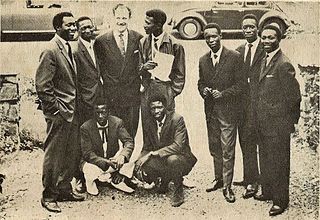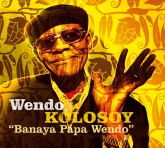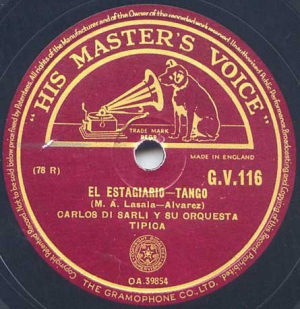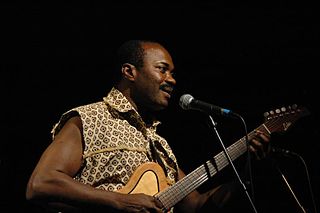Related Research Articles
The term rumba may refer to a variety of unrelated music styles. Originally, "rumba" was used as a synonym for "party" in northern Cuba, and by the late 19th century it was used to denote the complex of secular music styles known as Cuban rumba. Since the early 20th century the term has been used in different countries to refer to distinct styles of music and dance, most of which are only tangentially related to the original Cuban rumba, if at all. The vague etymological origin of the term rumba, as well as its interchangeable use with guaracha in settings such as bufo theatre, is largely responsible for such worldwide polysemy of the term. In addition, "rumba" was the primary marketing term for Cuban music in North America, as well as West and Central Africa, during much of the 20th century, before the rise of mambo, pachanga and salsa.
Congolese music is one of the most influential music forms of the African continent. Since the 1930s, Congolese musicians have had a huge impact on the African musical scene and elsewhere. Many contemporary genres of music, such as Kenyan Benga and Colombian Champeta, have been heavily influenced by Congolese music. In 2021, Congolese rumba joined other living traditions such as Jamaican reggae music and Cuban rumba on UNESCO's "intangible cultural heritage of humanity" list.
Soukous is a genre of dance music from Congo-Kinshasa and Congo-Brazzaville. It derived from Congolese rumba in the 1960s, becoming known for its faster dance rhythms and bright, intricate guitar improvisation, and gained popularity in the 1980s in France. Although often used by journalists as a synonym for Congolese rumba, both the music and dance associated with soukous differ from more traditional rumba, especially in its higher tempo and longer dance sequences. Notable performers of the genre include Franco Luambo and his band TPOK Jazz, Papa Wemba, Sam Mangwana, Tabu Ley Rochereau, and Pépé Kallé.

Le Grand Kallé et l'African Jazz, often simply referred to as African Jazz, was a popular and extremely influential Congolese rumba (soukous) band from the modern-day Democratic Republic of the Congo. Founded in 1953 in Léopoldville under Belgian colonial rule, the band was led by Joseph Kabasele Tshamala, popularly known by his stage name Le Grand Kallé. The group saw its heyday between 1958 and 1962, after which it was hit by defections by its members in 1963. It was briefly revived after 1966.

Jules Shungu Wembadio Pene Kikumba, known professionally as Papa Wemba, was a Congolese singer and musician who played Congolese rumba, soukous, and ndombolo. Dubbed the "King of Rumba Rock", he was one of the most popular musicians of his time in Africa and played an important role in world music. He was also a fashion icon who popularized the Sape look and style through his musical group Viva la Musica, with whom he performed on stages throughout the world.

The culture of the Democratic Republic of the Congo is extremely varied, reflecting the great diversity and different customs which exist in the country. Congolese culture combines the influence of tradition to the region, but also combines influences from abroad which arrived during the era of colonization and continue to have a strong influence, without destroying the individuality of many tribal customs.

Pascal-Emmanuel Sinamoyi Tabu, better known as Tabu Ley Rochereau, was a leading African rumba singer-songwriter from the Democratic Republic of the Congo. He was the leader of Orchestre Afrisa International, as well as one of Africa's most influential vocalists and prolific songwriters. Along with guitarist Dr Nico Kasanda, Tabu Ley pioneered soukous and internationalised his music by fusing elements of Congolese folk music with Cuban, Caribbean and Latin American rumba. He has been described as "the Congolese personality who, along with Mobutu, marked Africa's 20th century history." He was dubbed "the African Elvis" by the Los Angeles Times. After the fall of the Mobutu regime, Tabu Ley also pursued a political career. His musical career ran parallel to the other great Congolese rhumba bandleader and rival Franco Luambo Makiadi who ran the band TPOK Jazz throughout the 1960s, 1970s and '80s.

Ricardo Lemvo is a Congolese singer of Angolan descent who lives in Los Angeles, California. His music is a blend of African soukous, kizomba, samba and Cuban salsa.
Congolese rumba is a popular genre of dance music that originated in the Congo basin during the 1940s, deriving from Cuban son. The style gained popularity throughout Africa during the 1960s and 1970s.
Jean Baptiste Emeneya Mubiala Kwamambu was a Congolese singer best known as King Kester Emeneya.

Antoine Wendo Kolosoy, known as Papa Wendo, was a Congolese musician. He is considered the "Father" of Congolese rumba, also known as soukous, a musical style blending son cubano, beguine, waltz, tango and cha-cha.
Henri Bowane (1926–1992) was an influential figure in the development of Congolese rumba in the modern-day Democratic Republic of Congo. He was the first professional boss and early mentor to the legendary guitarist Franco Luambo.

The G.V. Series were a series of 10 inch 78 rpm Gramophone records produced in Europe and the United States from 1933 to 1958, and exported to colonial Tropical Africa. They are credited with introducing Afro-Cuban music into modern African popular culture. The resulting re-interpretations influenced the creation of several genres of African popular music.

Pépé Felly Manuaku, also known as Pépé Fely is a Congolese Rumba guitarist, songwriter, producer, arranger, Bandleader and lyricist from the Democratic Republic of Congo. He has been described as the foremost Congolese solo guitarist of his generation. He is a founding member of the iconic groups Zaïko Langa Langa, Les Ya Toupas and Grand Zaïko Wawa. His style of guitar is the last style officially credited as a "School" or Genre of guitar following the styles "Fiesta" created by "Le Docteur" Nico Kassanda and "Odemba" created by "Le Sorcier" Franco Luambo Makiadi. He is credited with establishing the guitar as the lead instrument in contemporary Congolese music introducing Synthesiser, Bouzouki, Advanced Guitar effect pedal techniques, new arrangement and recording techniques.

Élisabeth Tshala Muana Muidikay, known professionally as Tshala Muana, was a singer and dancer from Congo-Kinshasa. Considered the "Queen of Mutuashi", a traditional dance music from her native Kasai region, she is often called "Mamu National".
The following is a timeline of the history of the city of Kinshasa, Democratic Republic of the Congo.
Radio Congo Belge was a radio broadcaster in the Belgian Congo which played an important role in the early development and popularisation of Congolese rumba music across Africa in the aftermath of World War II.
Didier Kalonji, Known professionally by his stage name as Bill Clinton and Monseigneur or Macintosh is a Congolese singer-songwriter dancer and animator. he was a member of Wenge Musica Maison Mere orchestra by Werrason from 1997 to 2004. The name "Kalonji", as in Albert Kalonji, is a name traditionally associated with leaders of the Luba people.
In Congolese popular music, the term libanga refers to a common form of patronage whereby musicians name or praise wealthy or powerful sponsors publicly as part of their performances. A libanga is usually inserted into a song through listing individual names between verses or between verses and chorus. They can be sung, spoken, or shouted depending on context. Sometimes they are included for the purposes of a particular performance, or included in a recording.

Non Stop Dancing is the debut studio album by the Congolese rumba band Zaïko Langa Langa. Produced by Mfumu Muntu Bambi, it was released on the Zaire Music label in late 1974.
References
- 1 2 3 4 5 "Bob W. WHITE". University of Montreal. Retrieved 2023-06-25.
- 1 2 3 "Intercultural cities experts: WHITE Bob". Council of Europe. Retrieved 2023-06-25.
- ↑ "City-based inclusion networks in a post-multicultural world". University of Ottawa. 2020-02-24. Retrieved 2023-06-25.
- ↑ "Bob W. White". Migration Research Hub. Retrieved 2023-06-25.
- 1 2 3 4 5 "Bob W. White". Columbia University Libraries. Retrieved 2023-06-25.
- 1 2 3 "New Faculty". University of California Santa Cruz. 2001-01-01. Retrieved 2023-06-25.
- ↑ "Prof. Dr. Bob W. White, University of Montreal". Max Planck Institute for the Study of Religious and Ethnic Diversity. Retrieved 2023-06-25.
- ↑ "A City is Not A Country". Palgrave Macmillan. Retrieved 2023-06-25.
- ↑ "SYMPOSIUM 2: EQUITY, DIVERSITY, AND INCLUSION". New Librarianship Symposia. Retrieved 2023-06-25.